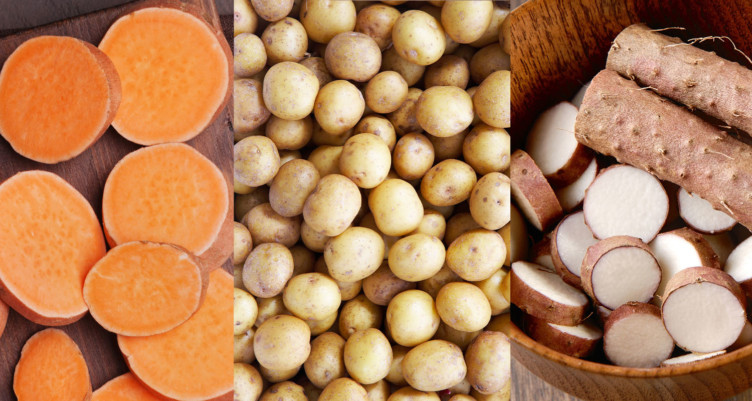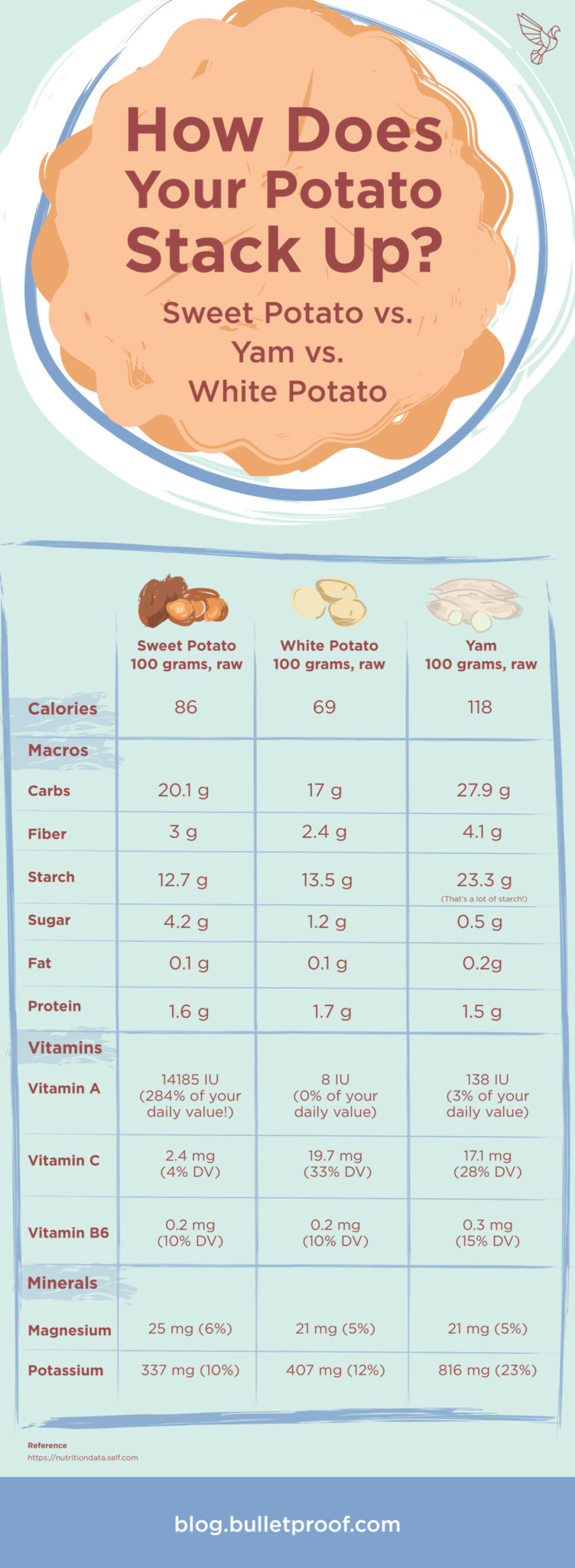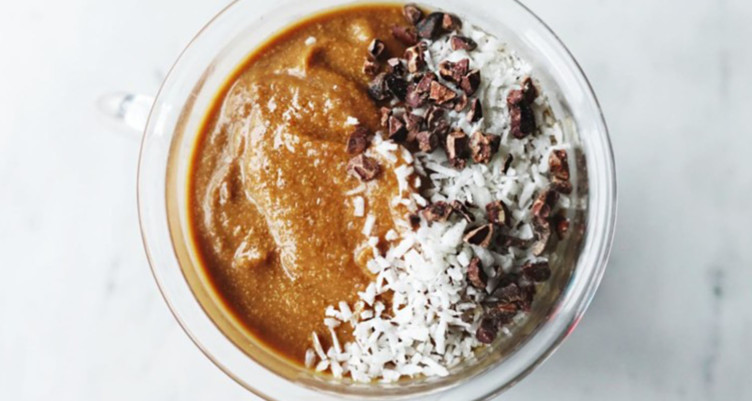Sweet Potato Nutrition Info and Health Benefits

- Sweet potatoes are a low-glycemic, nutrient-dense, Bulletproof-approved starch.
- These tubers are high in antioxidants and low in anti-nutrients like lectin.
- Compounds in sweet potatoes can improve blood sugar, insulin sensitivity, and fat storage.
Aside from the ongoing identity crisis between sweet potatoes and yams, the one big question around these orange tubers is: Why are sweet potatoes (and yams) Paleo and Bulletproof when purple, red, and white potatoes are not? What about the sweet potato nutrition profile makes them different than their other potato relatives?
These high-performance tubers store energy for the sweet potato plant, and provide clean-burning, low-toxin carbohydrates to fuel your body. Sweet potatoes are nutritionally dense as sources of starch, and, depending on the variety, can provide significant sources of antioxidants and compounds that improve blood sugar, insulin sensitivity, and fat storage.
As one of the few Bulletproof-approved starches, sweet potatoes also make an excellent addition for carb-refueling during cyclical ketosis (more on that later).
Read on to learn all the benefits of sweet potatoes, their nutritional info, and ways to incorporate them into your diet.
Sweet potato vs yam and white potato
 First: the age-old question… is that a sweet potato or a yam? Don’t worry, the sweet, orange, Thanksgiving-pie staple you know and love actually is a sweet potato (they also come in white and purple varieties). In fact, chances are you won’t come across a true yam in most grocery stores. While sweet potatoes, yams and regular potatoes may seem interchangeable in cookbooks, the three tubers actually come from distinct plant families.
First: the age-old question… is that a sweet potato or a yam? Don’t worry, the sweet, orange, Thanksgiving-pie staple you know and love actually is a sweet potato (they also come in white and purple varieties). In fact, chances are you won’t come across a true yam in most grocery stores. While sweet potatoes, yams and regular potatoes may seem interchangeable in cookbooks, the three tubers actually come from distinct plant families.
Sweet potatoes: Sweet potatoes, members of the Convolvulaceae family, are actually more closely related to the flowering Morning Glory vines than to other potatoes. The greens of sweet potato plants are also edible and nutritious.[1]
Yams: Yams are another type of tuber, from the family Dioscoreaceae. They are starchy roots with thick, bark-like skins, native to Africa and Asia. Grocery stores often mislabel the classic, well-known, orange-fleshed sweet potatoes as “yams,” originally a way to distinguish this newer variety from the traditional white-fleshed sweet potatoes in the U.S.
White potatoes: Regular white potatoes belong to the Solanaceae family, commonly known as nightshades, and are close relatives of tomatoes, peppers and eggplant. Members of the nightshade family contain high amounts of lectins, proteins that bind to the sugars that coat the cells in your body and cause inflammation.[2] Potatoes are also notorious for harboring mold and mycotoxins, another reason they are a high-risk food. While regular potatoes are not included on the Bulletproof diet, small amounts of properly stored raw potato starch can be a useful supplement for adding prebiotic resistant starch to your diet.
Sweet potato nutrition facts & benefits
 Even on a low-carb, high-fat diet like Paleo, keto or Bulletproof, your body still requires some amount of starch.
Even on a low-carb, high-fat diet like Paleo, keto or Bulletproof, your body still requires some amount of starch.
As Ashley Tudor, health innovator and author of Sweet Potato Power, mentions on this Bulletproof Radio podcast episode, “[Eating sweet potatoes] can be a really effective way to fill up your gas tank, without some of the negative side effects of eating high-carb foods.” What makes a sweet potato a high-performance starch?
Low in lectins: Sweet potatoes are low in anti-nutrients, like the protein toxins, lectins and patatin. Lectins are tied directly to inflammation and autoimmune reactions in your body.
Low glycemic index: The sugar content in sweet potatoes is low in both fructose and glucose.[3] Combined with slow-digesting starch, this gives sweet potatoes their relatively low glycemic index rating, meaning they won’t spike blood your sugar and insulin levels as high as regular potatoes or other starch-heavy foods.
High in beta-carotene: Sweet potatoes are also high in vitamins, minerals and antioxidants. Notably, orange-fleshed sweet potatoes are an excellent source of vitamin A, specifically its precursor, the antioxidant beta carotene. This powerful antioxidant enhances night vision in people who are vitamin A-deficient.[4] (Pro tip: adding fat such as grass-fed butter to your sweet potato will increase your absorption of beta carotene!).[5]
Good for your gut: Sweet potato starch is also rich in soluble fiber, an important prebiotic for feeding the good bacteria in your gut.
Fights cancer and inflammation: Studies have shown that sweet potatoes boost anti-cancer, anti-diabetic, and anti-inflammatory activities in your body.[6]
Improves blood sugar and cholesterol: Compounds found in their skin also improve insulin sensitivity, blood sugar control, cholesterol, and triglyceride levels in diabetic patients.[7]
Helps regulate weight: An extract called Caiapo found in white-skinned sweet potatoes improved glucose control and insulin sensitivity, in addition to upregulating adiponectin, the fat-regulating hormone that stops your body from packing on extra pounds.[8]
A caution for those especially sensitive to mycotoxin exposure: Starch is a preferential food for mycotoxin forming fungi.[9]Depending on their harvesting, processing and storage, sweet potatoes (like other potatoes) can end up harboring fungal contamination or mycotoxins.

How to add sweet potatoes to your diet
 On a keto diet: One of the best uses for sweet potatoes in your diet is as a fuel for carb re-feed days on a cyclical keto diet. Keto is the high-fat, low-carb diet that causes your body to burn fat, instead of glucose, for fuel. Cyclical ketosis, or carb cycling, simply means going in and out of ketosis on a weekly basis. Full ketosis doesn’t suit everyone, so introducing clean carbs like sweet potatoes one day a week helps support your body systems that need a little extra glucose to run smoothly.
On a keto diet: One of the best uses for sweet potatoes in your diet is as a fuel for carb re-feed days on a cyclical keto diet. Keto is the high-fat, low-carb diet that causes your body to burn fat, instead of glucose, for fuel. Cyclical ketosis, or carb cycling, simply means going in and out of ketosis on a weekly basis. Full ketosis doesn’t suit everyone, so introducing clean carbs like sweet potatoes one day a week helps support your body systems that need a little extra glucose to run smoothly.
How do you know if your body needs that boost? Some of the first symptoms of cutting carbs for too long include having very dry eyes and poor sleep quality. Eating no carbs for extended periods can also damage your thyroid.[10]
Outside of a keto diet, if you are an athlete, or aiming to maintain your current weight, one or two servings of carbohydrates a day will bring you the benefits of low-carb dieting, with the extra energy you need to stay fueled. After a workout is a great time to show your body some sweet-potato-love. This Protein-Packed Sweet Potato Smoothie is perfect for refueling your glycogen stores post-training session.
As a clean carbohydrate source, sweet potatoes are also awesome for transitioning comfortably to a low-carb diet. “If you’re just starting out on your weight-loss journey,” says Tudor, “sweet potatoes are a great way to replace some of the more egregious carbs in the diet like wheat and rice.” Satisfy your sweet carb cravings without hitting the grains with recipes like our Savory Sweet Potato Waffles or Cinnamon Pecan Sweet Potatoes.
Sign up for early access to sales, product launches, the latest Bulletproof news and more!



